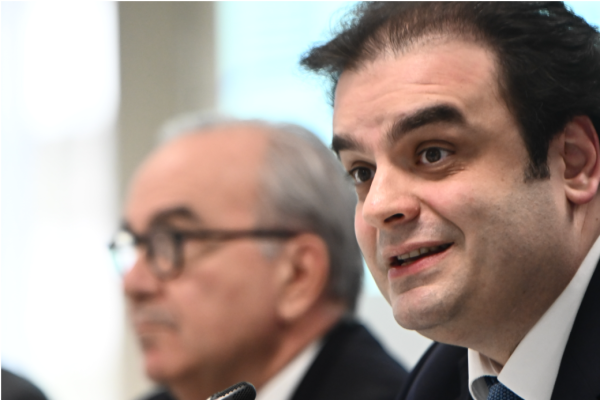
Kostas Simitis, Greece’s former Prime Minister, died this morning, January 5, at the age of 88.
Simitis led the PASOK party and served as Prime Minister from 1996 to 2004, succeeding Andreas Papandreou. As Prime minister he advocated economic reform and deeper European integration, and he played a pivotal role in Greece’s adoption of the euro.
Born in Athens in 1936, Simitis studied law and economics in Germany and England. He began his academic career as an assistant professor at the University of Konstanz in 1971, later becoming a professor at the University of Giessen (1971–1975) and Panteion University in Athens (1977). During Greece’s dictatorship, he fled abroad and joined the Panhellenic Liberation Movement (PAK) in 1970, serving on its National Council. A founding member of PASOK, Simitis was part of its first Executive Office.
Simitis held several ministerial roles, including Minister of Agriculture (1981–1985), National Economy (1985–1987), and Industry and Trade (1993–1995). He was first elected as a parliamentarian for Piraeus in 1985. On January 18, 1996, he succeeded Andreas Papandreou as prime minister, representing PASOK’s “modernizing” wing with a focus on economic reforms and aligning Greece’s economy with Europe’s standards.
Following Papandreou’s death, Simitis was elected PASOK president at the party’s 4th Congress in June 1996. He secured re-election as prime minister in the 1996 and 2000 general elections. During his tenure, he championed economic stability through privatization of state enterprises, a moderate foreign policy, and Greece’s successful accession to the Economic and Monetary Union in 2001.
As PASOK president, Simitis steered the party toward a centrist, pro-European stance. His second term was marked by austerity measures to combat inflation and national debt, as well as initiatives to address Greek-Turkish disputes concerning Cyprus.
Simitis is survived by his wife, Daphne, and their two daughters.
Source: Tovima.com
Latest News

Athens to Return Confiscated License Plates Ahead of Easter Holiday
Cases involving court orders will also be excluded from this measure.

Servicers: How More Properties Could Enter the Greek Market
Buying or renting a home is out of reach for many in Greece. Servicers propose faster processes and incentives to boost property supply and ease the housing crisis.

Greek Easter 2025: Price Hikes on Lamb, Eggs & Sweets
According to the Greek Consumers’ Institute, hosting an Easter dinner for eight now costs approximately €361.95 — an increase of €11 compared to 2024.

FM Gerapetritis Calls for Unified EU Response to Global Crises at EU Council
"Europe is navigating through unprecedented crises — wars, humanitarian disasters, climate emergencies," he stated.

Holy Week Store Hours in Greece
Retail stores across Greece are now operating on extended holiday hours for Holy Week, following their Sunday opening on April 13. The move aims to accommodate consumers ahead of Easter, but merchants remain cautious amid sluggish market activity.

Green Getaway Ideas for Easter 2025 in Greece
Celebrate Easter 2025 in Greece the sustainable way with eco-farms, car-free islands, and family-friendly getaways rooted in nature and tradition.

Civil Protection Minister Details Summer Firefighting Plans at Delphi Forum
At the 10th Delphi Economic Forum, Minister of Climate Crisis and Civil Protection Yiannis Kefalogiannis discussed Greece's plans for the upcoming fire season.

How Shops and Markets Will Operate During Easter Holy Week
The Easter holiday schedule has been in effect since April 10, with retail stores open Palm Sunday, and most supermarkets also operating to meet consumer demand for Easter shopping

Why Is the French Aircraft Carrier Charles De Gaulle in Piraeus?
Docking in Piraeus after a four-month deployment in the Indo-Pacific region, the admiral of the aircraft carrier the Charles de Gaulle says, "Greece is our best partner in the Mediterranean."

Riots and Vandalism in Downtown Athens Exarcheia Region
Night of unrest in downtown Athens' region of Exarcheia – 11 Cars Burned, 72 Detentions









































 Αριθμός Πιστοποίησης
Αριθμός Πιστοποίησης